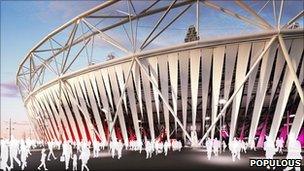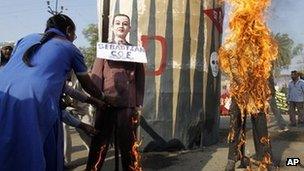London 2012: India 'to raise role of Dow Chemical'
- Published

The Dow Chemical-sponsored wrap will go up around the stadium in early 2012
India's government has instructed its Olympics officials to raise the issue of Dow Chemical's sponsorship of the 2012 London Games with its organisers.
The sports ministry told the Indian Olympic Association (IOA) to convey its concerns, saying there was "strong public sentiment" on the issue.
Dow has links to the firm behind the gas leak disaster in Bhopal in 1984.
The IOA said it would "make the organisers aware of the feelings of the people who have suffered".
Dow is funding a wrap around the Olympic stadium.
'World outcry'
In a letter to the IOA, the sports ministry said: "Strong public sentiment exists in this matter and a number of eminent ex-Olympians have also raised concerns.
"We would advise the Indian Olympic Association to raise this matter immediately with the IOC while keeping the government informed."
IOA acting president Vijay Kumar Malhotra had said last week the issue would be raised with the organisers.

On Friday protesters in Bhopal burned effigies of Olympics organiser Lord Coe and Mr Malhotra
But he also said: "There is no question of India boycotting the London Olympics. We are not boycotting the Olympic Games and that is very clear on the IOA's part."
On Monday in an IOA statement, Mr Malhotra said the IOA had "received representations from several former Olympians and NGOs protesting against the London Games Organisers' link with Dow Chemical".
He said the issue would be discussed on 15 December.
"We will try to make the Games organisers aware of the feelings of the people who have suffered due to that tragedy.
"It is not only the Indians who are protesting this sponsorship, there has been an outcry against this world over from various NGOs and other bodies - it is no longer a local issue."
On Friday, the eve of the 27th anniversary of the disaster, scores of survivors burned effigies of Olympics organiser Lord Coe and Mr Malhotra.
In 1999, Dow merged with the Union Carbide Corporation, whose subsidiary Union Carbide India ran the Bhopal pesticide plant where the disaster happened.
The gas leak was one of the world's worst industrial disasters.
The Indian government says more than 3,000 people died within days of the leak.
It says that more than 15,000 have died since then.
Campaigners say the death toll is as high as 25,000 and that the effects of the leak continue to this day.
Dow has said in the past that its $470m (£288m) settlement for those affected by the tragedy is fair and final.
The company insists that while the past must never be forgotten, its "position as a Worldwide Olympic Partner" represents its "vision for the future".
Dow has said that although it "never owned nor operated the [Bhopal] plant and the legal claims surrounding the incident were resolved in 1989, long before Dow acquired Union Carbide, we - along with the rest of industry - have learned from this tragic event and have helped to drive global industry performance improvements to ensure that such incidents never happen again".
- Published2 December 2011
- Published28 November 2011
- Published15 November 2011
- Published8 August 2011
- Published4 August 2011
- Published8 February 2011